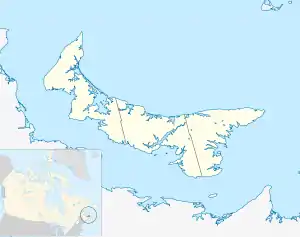Central Bedeque
Central Bedeque is a former municipality that previously held community status in the Canadian province of Prince Edward Island.[1] It was dissolved through its amalgamation with the Community of Bedeque on November 17, 2014 to create the Community of Bedeque and Area.[1] It is located north of Borden-Carleton within Lot 26, Prince County. Its primary industry is agriculture.
Central Bedeque | |
|---|---|
Former community | |
 Central Bedeque in Prince Edward Island | |
| Coordinates: 46.340°N 63.703°W | |
| Country | Canada |
| Province | Prince Edward Island |
| County | Prince County |
| Parish | St David's |
| Lot | Lot 26 |
| Adopted | 1925 |
| Recognized | 1944 |
| Incorporated | 1966 |
| Amalgamated[1] | November 17, 2014 |
| Population (2001) | |
| • Total | 186 |
| Time zone | AST |
| • Summer (DST) | ADT |
| Canadian postal code | C0B 1G0 |
| Area code | 902 |
| Telephone Exchange | 887 |
| NTS Map | 11L5 Summerside |
| GNBC Code | BAECM |
History
The name, Central Bedeque, was first adopted in 1925, and was confirmed in 1944. It was established as a village in 1966. Its former names were the Strong's Corner, and the Weatherbie's Corner until the name was changed to Central Bedeque when it was incorporated.
Geography
Central Bedeque is located northwest of Borden-Carleton in the central part of the province on the south shore (fronting the Northumberland Strait), and is on the Dunk River.
Central Bedeque traces its name to neighbouring Bedeque (which it also shares with neighbouring North Bedeque and Lower Bedeque). The name "Bedeque" may be a corruption of a term used by the Mi'kmaq Nation with several meanings such as "sunny camping place" or "the hot place".
References
- "EC2014-524: Municipalities Act, Community of Central Bedeque and Community of Bedeque Amalgamation" (PDF) (PDF). Government of Prince Edward Island: Executive Council. September 9, 2014. p. 2. Retrieved February 8, 2015.
- "Table 2: Population of Census Subdivisions, 1921–1971". 1971 Census of Canada (PDF). Population. Vol. Census Subdivisions (Historical). Ottawa: Statistics Canada. July 1973. Retrieved February 3, 2022.
- "1976 Census of Canada: Population - Geographic Distributions" (PDF). Statistics Canada. June 1977. Retrieved February 3, 2022.
- "1981 Census of Canada: Census subdivisions in decreasing population order" (PDF). Statistics Canada. May 1992. Retrieved February 3, 2021.
- "1986 Census: Population - Census Divisions and Census Subdivisions" (PDF). Statistics Canada. September 1987. Retrieved February 3, 2022.
- "91 Census: Census Divisions and Census Subdivisions - Population and Dwelling Counts" (PDF). Statistics Canada. April 1992. Retrieved February 3, 2022.
- "96 Census: A National Overview - Population and Dwelling Counts" (PDF). Statistics Canada. April 1997. Retrieved February 3, 2022.
- "Population and Dwelling Counts, for Canada, Provinces and Territories, and Census Subdivisions (Municipalities), 2001 and 1996 Censuses - 100% Data (Prince Edward Island)". Statistics Canada. August 15, 2012. Retrieved February 3, 2022.
- "Population and dwelling counts, for Canada, provinces and territories, and census subdivisions (municipalities), 2006 and 2001 censuses - 100% data (Prince Edward Island)". Statistics Canada. August 20, 2021. Retrieved February 3, 2022.
- "Census Profile, 2016 Census: Central Bedeque, Community [Dissolved census subdivision], Prince Edward Island and Prince Edward Island [Province]". Statistics Canada. October 27, 2021. Retrieved February 3, 2022.